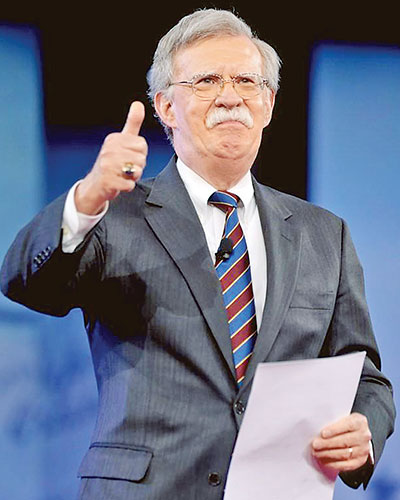MUSLIMS ENTER AMERICAN POLITICS
- 10 Nov - 16 Nov, 2018
I had something else all planned to write about this week, even filled a couple notebook pages with notes. Then Donald Trump blew my plans out of the water by appointing John Bolton as his new National Security Advisor. On a personal level I resent having to write about, or even pay any attention to, Donald Trump. Unfortunately, though, the fact that he is President of the United States does impinge on my reality.

The worst-case scenario here in America just keeps getting worse. By the time you read this, you probably will have read other articles by writers better qualified than I am to explain or comment on the particulars of Bolton’s utter dreadfulness. Writing in The Guardian the day after the (so far figurative) bombshell dropped, Walter Shapiro of Yale University called Bolton “the kind of uber-hawk who will always choose conflict over conciliation.” Shapiro also ruefully noted “the total collapse of the establishment theory that a race of bemedaled generals and oil-industry titans could contain Trump.”
Other writers have correctly noted Bolton’s extreme anti-Muslim views and the very real danger that he and Trump could lead America – and other countries, needless to say – into one or more very real wars. The New York Times bluntly headlined a blunt editorial, “Yes, Bolton Really Is That Dangerous.” Former State Department official Michael H. Fuchs began his own Guardian piece: “Donald Trump is assembling his war cabinet. The appointment of John Bolton as national security advisor – following the nomination of CIA director Mike Pompeo as secretary of state – could be the beginning of Trump’s march to war. Or wars… If you’re not scared yet, you should be.” In case all that wasn’t clear enough, Fuchs ended his piece: “This is a genuine national emergency.”
It’s also important to note – as with Gina Haspel, Trump’s appointee as the new CIA chief to replace Pompeo – that Bolton does not represent something radically different coming from this regime. What Haspel and Bolton both represent is continuity of personnel – thus also of attitudes, approaches, and policies – between Trump and the George W. Bush administration. It’s been fashionable of late to wax mildly nostalgic about Bush, to murmur, “Oh, gosh, compared to Trump, folksy ol’ George Bush wasn’t really so bad.” Well, yes he was. It behooves us not to forget just how bad Bush and his regime were, beginning with the stolen election in 2000 and culminating with the immense damage wrought in Iraq and throughout the Middle East. As U.S. ambassador to the United Nations, John Bolton was an essential member of the Bush team. And Bush set the stage for Trump. In between, Obama provided a partial respite but also continued and even increased and legitimised some of the worst things Bush began, like drone strikes and Guantanamo Bay.
My caveat in telling you these things, especially given that it’s Trump we’re dealing with now, is that we can scarcely imagine how the world situation might change between the time I write this and the time you read it. And my concern, as both a writer and an ordinary person trying to live my life in peace, is with how to understand all that we’re enduring these days and how to negotiate my own way through it. I’m tempted to withdraw into a quietist stance, or to write about things other than how appalling Trump and his regime are. Indeed, the topic I was planning to write about this week was how daily life in residential neighborhoods like mine in Seattle is being affected – for better and worse – by the powerful presence of Amazon in this city that is home to its global headquarters. But I can write about that next week, or the week after that. What you need to know right now is this other stuff. The threat of global war trumps, so to speak, how Amazon affects civic life in Seattle. We can’t ignore Trump and Bolton, much as I for one would love to.
But at the same time, we have to try not to waste emotional energy resenting and fearing them, because there really is more to life than politics and war. There has to be, if life is to be worth living. But it’s easier said than done, I know. I read an eloquent statement of exactly this point recently in the Seattle Times, my hometown newspaper, from the American composer John Luther Adams, whose new composition “Become Desert” I’ll have the pleasure of hearing played live here on March 31. “Given the state of the world today, I’ve come to believe that art is actually more important than ever,” Adams told the Times. “Ideas never come from politics; they originate in culture. Like so many of us these days, I am trying to imagine a new way of being in this world.”
There’s actually no more important task facing any of us in these alarming times, whether in America or Pakistan or anywhere else. The great British novelist J.G. Ballard called “the unrestricted imagination… the most accurate guide to reality.” The American writer Norman Mailer – who was both a great novelist and a great reporter – claimed there was “no clear dividing-line between experience and imagination.” The conundrum is that the danger of Trump and Bolton is far from imaginary. Whatever further damage they wreak henceforth, whether in North Korea, Iran, Pakistan, America itself, or who knows where, will be all too real. But our urgent task – yours and mine – is to imagine into reality a world in which they and their ilk no longer call the shots both figurative and literal.
How will we do that? As I said, it’s easier said than done. But what makes it easier both to imagine and to accomplish is that it’s urgently necessary.
COMMENTS